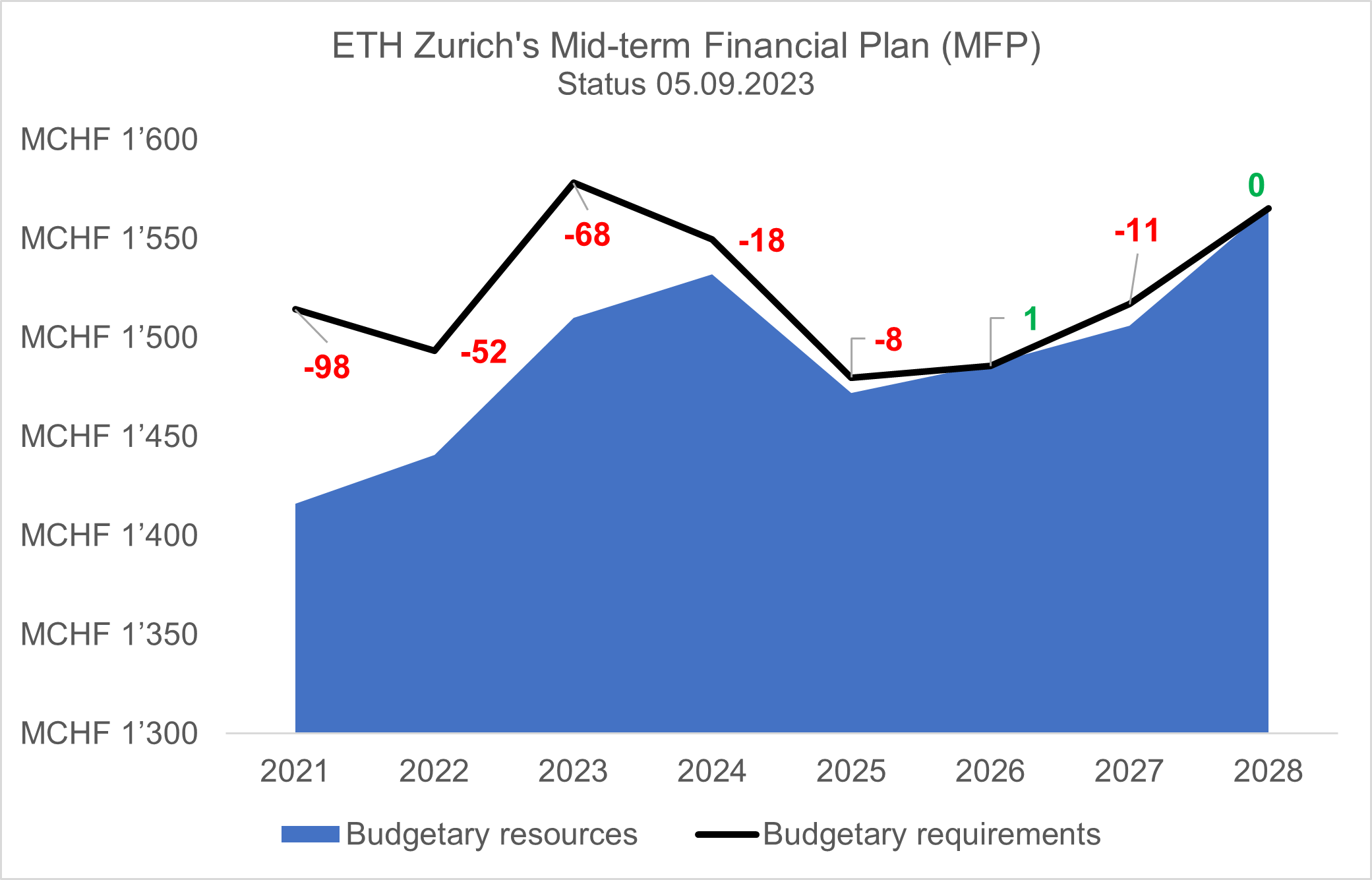
“We’re on course with our cost-saving measures”
The savings measures announced in June are having an effect. ETH Zurich’s 2024 budget deficit will be less than originally predicted. This can be attributed to the efforts of the academic departments and central administrative units, both of whom have done their homework. Given the persistent constraints on government spending and ETH Zurich’s resolve to safeguard its flexibility for new strategic initiatives, financial prudence is still required.
The Swiss parliament has still not ratified the two percent cut in the federal government’s contribution to ETH Zurich for 2024. The final decision will be made in December. One thing is clear, however: the Federal Council wants to – indeed has to – comply with the requirements of the debt brake anchored in the constitution. The financial consequences of the Coronavirus pandemic, the Ukraine war, high inflation rates and soaring energy costs leave little prospect of conditions easing. The situation is also aggravated by the fact that the ERI Dispatch 2025-2028, which provides the basis for ETH’s funding, allows for an annual increase in funding of just 1.6%, which is not enough given the current growth in student numbers.
Greater efforts bring rewards
At the town hall meeting of 11 May 2023, the ETH Executive Board already made clear that the university is prepared to play its part in balancing the federal budget. “As an institution receiving around seventy percent of its funding from the federal government and commanding an annual budget of almost CHF 2 billion, we have a duty to play our part in contributing to healthy government finances,” says Stefan Spiegel, Vice President for Finance and Controlling at ETH Zurich, who is full of praise about the cost-savings measures taken to date. “Enormous efforts have been made in all areas over the past months. On behalf of the Executive Board, I’d like to thank everyone for their contribution.”
Less of a deficit expected for next year
Excluding third-party funding, which fluctuates from year to year, the budget deficit predicted for 2024 is still CHF 18 million. This is, however, an improvement of CHF 50 million compared with the current year, which is set to close with a deficit of CHF 68 million. The figures reported for 2021 and 2022 were almost CHF 100 million and over CHF 50 million respectively (see Figure 1). This improvement was mainly due to the academic departments, as well as the departments and staff units of the Executive Board domains. The academic departments’ budgets underwent a linear cut of three percent (CHF 20 million in total), while the central administrative units were cut by five percent (CHF 40 million in total). Structural personnel cost increases (“PA-Abtretungen”), such as inflation, are not accounted for in this perspective.
The reason why figures are projected to nevertheless remain in the red in 2024 can be mainly attributed to two factors: a further increase in energy costs (around CHF 6 million) and about CHF 10 million in third-party funding for building investments that had to be deferred to 2025 and beyond.
“We are working to close the structural deficit in our funding,” Stefan Spiegel stresses, while making it clear that extra efforts are still needed to balance the ETH budget. In particular, the central administrative units must continue to deploy their resources as efficiently as possible and clearly prioritise their projects, while the academic departments should continue to successfully attract third-party funding in future.
Impact of saving measures will be noticeable
To achieve their targets, the Executive Board domains had to review the services they offer and also cut them back in some cases. The list (which is not exhaustive) of savings measures having noticeable consequences for the academic departments and the entire university includes the following:
- Individual communication platforms for ETH researchers will be discontinued or cut back: for instance, ETH’s presence at Olma, Switzerland’s biggest trade fair open to the public, or the ETH Podcast as a platform for showcasing researchers.
- The budget for exhibitions, such as ETH’s attendance at the World Economic Forum (WEF), has been further reduced.
- Seldom-used multifunction printers will be decommissioned and longer cycles set for hardware upgrades.
- Costs will be trimmed for cleaning and maintaining buildings, as well as for repairs.
- In the real estate area, costs will be optimised by introducing a new execution process. Strategically important projects will be prioritised more consistently than before.
- Various measures will be reviewed in the area of scientific publications and research data and all those affected will be informed directly.
- Prices for parking spaces will be raised to the going market rate, as was already decided some time ago.
- Central cost coverage (bridging) in the event of employee sickness will be reduced after one month to 50% (from 100% today) as of 1 January 2024.
- The UNITECH student exchange programme will be wound up due to weak demand from ETH students.
- Substantial savings on rental costs for examination rooms will be possible thanks to automated examination planning.
Always up to date
Would you like to always receive the most important internal information and news from ETH Zurich? Then subscribe to the "internal news" newsletter and visit Staffnet, the information portal for ETH employees.

Comments
No comments yet